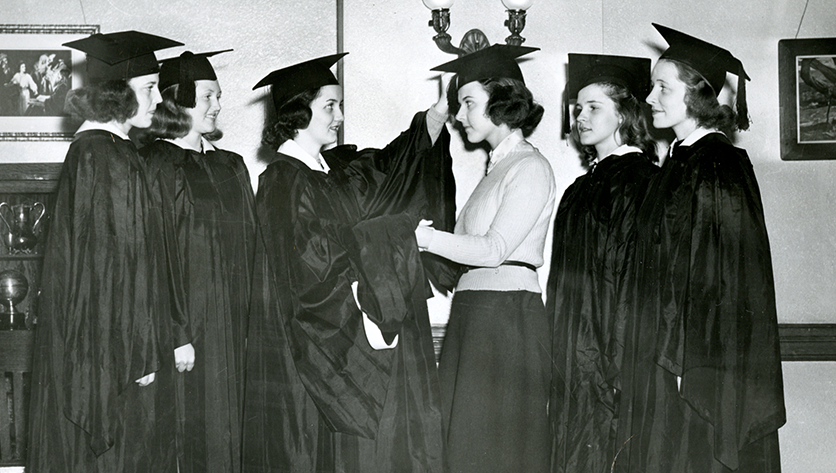Honor Code Marks 80th Year of Integrity Inside and Outside the Classroom

According to the University’s handbook from 1939, every student of Notre Dame accepted the Honor System at entrance. This remains true today: incoming Notre Dame students are required to adhere to the Honor Code upon entrance. In the last two years, first-year students and transfer students signed a pledge book in token of this acceptance during the Cap and Gown Investiture.
The Honor Code was initially created for unproctored examinations, but soon encompassed all parts of college life for students. An editorial from the May 1936 issue of Columns stated that the honor system was a chance for students to prove their worth as they pursued an A.B. degree and to show what it meant to have a “fine sense of justice” in their community.
Twenty-four years later, the 1960 handbook linked this personal honor to community honor by providing specifics on how the system covers students’ life outside of the classroom. “Just as honor cannot be imposed, neither can it be divided. It cannot operate in the classroom and cease to operate in the smoker [a lounge in which students gathered, often to smoke cigarettes]. It cannot regulate your academic performance and have no bearing on your social life,” it said. From then on, specific information about the scope and procedure of the Honor Code was included, such as the violations it covers and how the Honor Board addresses these violations.
Throughout the years, it became clearer that the Honor Code was more than just an academic code of conduct. It was a way of life for members of the Notre Dame community. The most recent handbook states that the Honor Code not only “signifies the ideal of academic and personal integrity” of each student, but also “strengthens the entire community and cultivates an atmosphere of unity founded on trust.”
But what does this mean to individuals? Cristina Barrios-Lopez ’17, a criminology major and Honor Board secretary, says that “by living life and taking the Honor Code into consideration, we take responsibility for our actions and others’.” She believes that the code means making a difference in our community by being accountable and being a person of integrity.
Brittany Martinez ’18, an English student and Honor Board chairperson, values the same idea of integrity that it instills. “The Honor Code, to me, establishes trust throughout the Notre Dame community. This extends from students, to faculty, to staff and to administration,” she explains.
NDMU President Marylou Yam, Ph.D. comments on what this integrity should look like on campus. “Our students have a responsibility to the academic community [that they fulfill] by participation in supporting the culture of honesty and in open and civil discourse both in and outside of the classroom,” she says.
Dr. Yam also links the Honor Code to the university mission. “It is consistent with the mission of NDMU to build inclusive communities and to promote social responsibility,” she explains. “Each year, I am always moved by hearing our new students cite the Honor Pledge and become members of our academic community. I have an overwhelming sense of appreciation for this cherished tradition.”
Meanwhile, David Hoovler, Ph.D., an associate professor in the political science department, recognizes the Honor Code as a “religious and spiritual commitment of the highest order. It involves wise understanding, intentions, livelihood, speech and action.” As a professor in his 35th year at Notre Dame, Dr. Hoovler says, “it should be celebrated on a daily basis as the cornerstone of our commitment to what we profess and what we are called to embody. The honor in the Honor Code is best seen as a verb rather than a noun.”
From students, to staff, to faculty—all are excited about the 80th anniversary of the Honor Code. They recognize the privilege and responsibility it offers. Reflecting on the history of the Honor Code reminds them of the uniqueness of the Notre Dame community.
Honor Pledge
With a keen sense of responsibility,
I accept this symbol of my entrance
into the world of scholarship.
And I give this pledge of my purpose
to wear it worthily.
I shall try to follow all truth,
I shall try to see all beauty,
I shall try to be all goodness,
and thus to come to that
Eternal Wisdom
Which is the Word of God.




